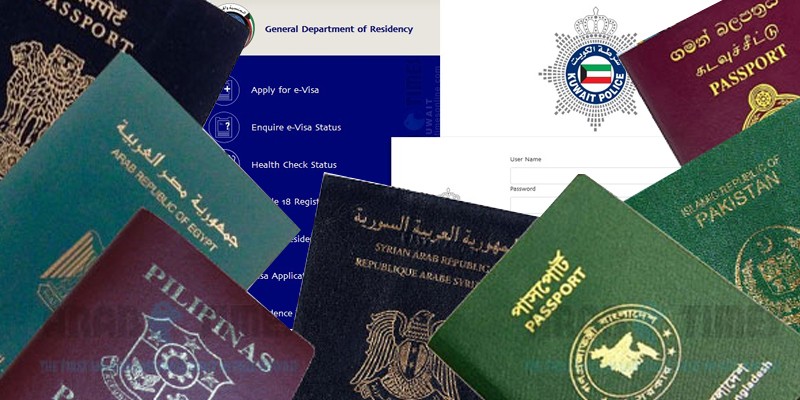28/09/2023
28/09/2023

KUWAIT CITY, Sept 28: On Sunday, the Parliamentary Committee on Interior and Defense is set to discuss the "Expats' Residency" project, which has been presented multiple times. It is expected that the articles of this proposal will be concluded in readiness for its submission to the National Assembly during the upcoming session's commencement.
The draft project includes 37 articles and 7 chapters and contains articles specifying the mechanism for the entry and deportation of expats, notifying the competent authorities, and trafficking in residency and penalties.
Furthermore, a Kuwaiti woman who is married to a foreign national is granted the privilege of sponsoring her spouse and children, under the condition that she has not acquired citizenship as per Article 8. Additionally, a Kuwaiti citizen is eligible to obtain a residence permit for her foreign husband and children. It's imperative that a Kuwaiti woman hasn't gained citizenship through marriage to a fellow Kuwaiti. Moreover, a widow or a divorced Kuwaiti citizen who has children with a foreign national is also eligible to secure a residence permit, reports Al Rai Daily.
The amendments stipulate that managers of hotels and furnished residences designated for rental to expats must promptly notify the relevant authority within the Ministry of Interior about the arrivals and departures of these expatriates within a 48-hour timeframe. This provision obliges hotels and furnished apartments to report on expatriates renting their accommodations and subject them to oversight by judicial authorities.
Meanwhile, the fees associated with residency, its extension, and all categories of visit visas will be determined through a ministerial decision. Furthermore, individuals appointed by the Minister of Interior will be empowered to examine records, identify any violations observed during inspections, and compile necessary reports concerning these matters.
The new amendments to the law include punishment for human trafficking by exploiting, recruiting, or facilitating the recruitment of an expat in exchange for finance or a benefit. The law imposes criminal penalties and additional penalties of imprisonment for a period not exceeding 3 years and a fine of not less than 5,000 and not more than 10,000 dinars for those who violate the law.
Earlier, the government submitted a memorandum that included amendments to bring its viewpoints closer to the members of the committee after representatives expressed their objections to some of the project’s articles.
Furthermore, foreign nationals may be granted temporary residence in Kuwait for a duration not surpassing three months. It is mandatory for them to depart the country upon the expiration of this temporary residence unless they secure an extension from the Ministry of the Interior, which cannot exceed one year.
Expatriates are eligible to stamp regular residence permits for a maximum of five years. Moreover, individuals falling under the category of the children of Kuwaiti women and property owners in the State of Kuwait may obtain residency for a period not exceeding ten years.
Additionally, investors can be granted residency for up to 15 years, subject to a decision by the Council of Ministers that outlines the specifics of their investments, including their scope, categories, and the invested amounts.
The legislation incorporates regulations regarding the residency of foreign nationals, specifying that an employee in a government organization cannot obtain a residency permit from another entity without the endorsement of the organization where they are currently employed. Similarly, an employee in a non-governmental entity can only secure a residency permit with the consent of the relevant competent authority.
The memorandum included changes pertaining to domestic workers, allowing them and similar categories to obtain a standard residency permit in accordance with the guidelines outlined in Article 13 of this law. This permission is granted within the confines of the duration specified in their employment contract. In the event that a worker's residency status is terminated upon leaving their job, they are required to depart Kuwait within the timeframe set by the competent authority within the Ministry of Interior, unless they are granted a new residency permit prior to the expiration of this period
In every scenario, the transfer of residency for domestic workers or those of similar status is subject to approval from both the worker and the employer. Moreover, domestic workers are not permitted to remain outside of Kuwait for a period exceeding four months unless they obtain prior permission from the Ministry of Interior before this period expires.
The law bestows upon the Minister of Interior the authority to deport an expatriate, even if they possess a valid residency permit, in cases where the Ministry deems it necessary for the public interest, public security, or public morals, particularly if the expatriate lacks a legitimate source of income. Such deportation may also encompass the foreign family members whom the expatriate is responsible for supporting. When a deportation decision is issued for an expatriate, they can be detained for a maximum period of thirty days, with the possibility of renewal or execution of the deportation order. Furthermore, the Minister of Interior holds the discretion to exempt deported expatriates from any fines stemming from violations of this law, provided they depart from Kuwait.
Excluded from the provisions of this law, as outlined in the draft, are heads of state and their family members, officials and employees of diplomatic missions along with their families, holders of diplomatic, special, and political passports, as well as individuals deemed deserving of exemption by the Minister of the Interior based on considerations related to diplomatic courtesies.


